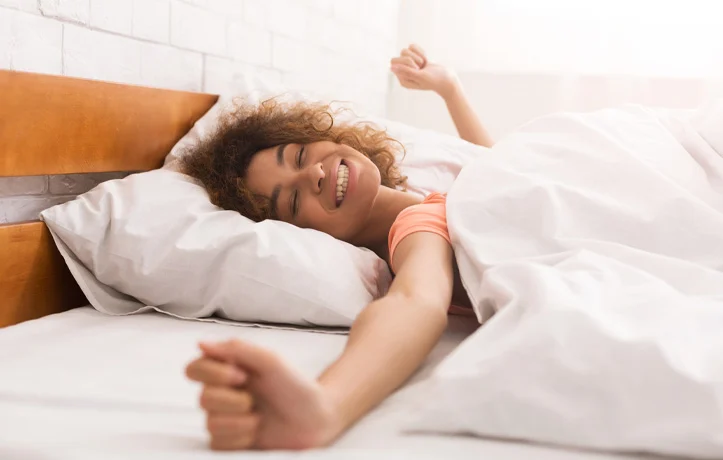DR. ALLISON J. BRAGER
Sleep and rest are crucial to our overall well-being. In fact, getting too little or even too much sleep can adversely affect our day-to-day physical health, energy levels, nutrition and mental well-being.
In the recently published “The Global Wellness Economy: United States” report authored by the Global Wellness Institute (GWI) as part of the Geography of Wellness microsite, research illustrates that sleep is a major factor in mental wellness, and this newly tangible wellness evidence is driving an explosion in the development of new sensory products and services designed to aid in the promotion of sleep. The National Academy of Sports Medicine (NASM) recognizes sleep as a fundamental pillar in its Certified Wellness Coach course and is the exclusive Geography of Wellness Country Partner for the United States in order to make this important research free and available to all. Download your copy here.
There is no lack of new sleep accessories, sleep-tracking devices or smart bedding, and a whole new category of tourism is emerging that includes wellness-centered hotels catering to those looking for a better night of sleep. However, in this article, we cover simple, straightforward, and—best of all—free methods you can use to strengthen your recovery and performance through better sleep habits.
MAXIMIZING SLEEP AND WELLNESS: A FORMULA
Disciplined sleep habits and an established sleep routine will contribute to a restorative night of sleep. Below is a schedule supported by clinical research and applied in extreme situations of non-restorative sleep (e.g., military deployed settings, outer space and other austere environments) but can be applied to everyday environments.
- 90 minutes before bed: No more work or stressful activities. Decompress.
- 60 minutes before bed: No more phones or electronics. This will help prime the nighttime release of melatonin.
- 30 minutes before bed: Take a hot shower or engage in a relaxing hobby to calm the brain, relax the body and prime the system for sleep.
- Right before bed: Sleep in a completely dark, cool (68℉) and quiet room.
THE ROLE THAT SLEEP PLAYS
One of the primary and universal functions of sleep is to conserve energy and promote the next-day optimization of performance. To do so, sleep is an active process that prioritizes the release of hormones and biological factors important towards energy conservation including nighttime build-up of fats and glucose reserves.
With the ability to utilize these fats and glucose reserves during the waking day, the body becomes less reliant on the external consumption of fats and glucose to maintain equilibrium. The end result of this process is important: sufficient sleep promotes sufficient maintenance of an individual’s body weight and body composition and sufficient reliance on internal fuel reserves to perform the next day optimally.
The bottom line? The key to weight maintenance or weight loss manifests from an evidence-based nutritional plan is a good night of sleep.
FUELING BETTER SLEEP
One additional benefit of restorative sleep for overall health and well-being is the fact that there are healthy and nutrient-dense foods that promote a good night of sleep. Very recently, scientists have discovered that isolated proteins in warm cow’s milk—casein tryptic hydrolysate (CTH)—are linked to reduced anxiety and improved sleep in mice with therapeutic potential in humans.
However, those who are dairy-free and gluten-free do not have to worry. There are a handful of natural and nutrient-dense foods that nearly everyone can enjoy that are additionally sleep-promoting:
- A glass of tart cherry juice. Tart cherry juice is a natural source of melatonin—the “hormone of darkness” that helps us fall and stay asleep. It has even shown promise in a clinical study of insomnia (Pigeon et al. 2010).
- A glass of beet (root) juice. If cherries are too sweet, beets may suit your palate. A recent study on trained male athletes has found that beetroot juice can reduce fatigue and indirectly improve sleep (Shamloo et al. 2018).
- Two kiwis. Kiwis are historically known to be a good source of antioxidants and serotonin—a neurochemical driving sleep processes. Like tart cherry juice, kiwis showed promise in a small clinical study of adults with sleep disturbances (Lin et al. 2011).
- A handful of walnuts. Like kiwis, walnuts have identifiable amounts of melatonin and serotonin that in one study have been shown to improve sleep quality.
HOW A CERTIFIED WELLNESS COACH CAN HELP WITH SLEEP
In NASM’s Certified Wellness Coach (CWC) course, Recovery is recognized as one of the five main pillars of wellness, alongside Movement, Nutrition, Mental Well-Being and Coaching. These pillars are interconnected and mutually supportive, influencing one another to promote overall well-being.
Recovery, which includes adequate sleep and rest, is a fundamental component of maintaining and optimizing physical and mental health. Here’s how recovery relates to the other pillars:
- Movement: Adequate recovery supports the effectiveness and sustainability of movement practices and exercise routines.
- Nutrition: Sleep plays a role in regulating appetite and hunger hormones, which can impact food choices and dietary patterns.
- Mental Well-Being: Quality sleep supports mental clarity, concentration and emotional resilience, all of which positively impact mental health.
- Coaching: By prioritizing recovery and ensuring adequate sleep, individuals can enhance their ability to make positive behavior changes, such as adopting healthier eating patterns, sticking to an exercise routine or managing stress effectively.
By addressing sleep and recovery as a foundational aspect of wellness alongside movement, nutrition, mental well-being and coaching, coaches can help clients achieve comprehensive and sustainable lifestyle improvements.
To conclude, restorative sleep at night has a major influence on waking behavior and choices. It is through sleep that our cravings for unhealthy foods decrease and our propensity for health increases. Sleep is a free and universal investment in health and health care—so why not sleep on it?

